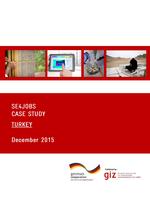Difference between revisions of "Turkey's Market Development and Employment Potentials in Renewable Energy and Energy Efficiency"
***** (***** | *****) (Created page with "= SE4JOBS Good Practice Case Study Turkey = = About the Publication = = Further Information = = Reference = {{Re-activate Footer}} Category:Turkey [[Category:Renewabl...") |
***** (***** | *****) m |
||
| Line 1: | Line 1: | ||
| − | = | + | {{Reactivate Grey Border}} <span style="color:#ffffff;">[[RE-ACTIVATE|► RE-ACTIVATE Project]]</span> </div> |
| + | <br/> | ||
= About the Publication = | = About the Publication = | ||
| + | |||
| + | {| style="width:100%;" | ||
| + | |- | ||
| + | | | ||
| + | '''Title''': SE4JOBS : Case Study: Turkey | ||
| + | |||
| + | '''Authors''': Prof. Klaus Jacob, Holger Bär | ||
| + | |||
| + | '''Published by''': Deutsche Gesellschaft für Internationale Zusammenarbeit (GIZ) GmbH | ||
| + | |||
| + | '''Published Date/Place''' : 2016, Berlin | ||
| + | |||
| + | '''Sector''': Renewable Energy and Energy Efficiency in the MENA region | ||
| + | |||
| + | Download link: [[:File:SE4JOBS_Good_Practice_Case_Study_Turkey.pdf|SE4JOBS Good Practice Case Study India 2015.pdf]] | ||
| + | |||
| + | | [[File:SE4JOBS Good Practice Case Study Turkey.pdf|border|right|150pxpx|alt=SE4JOBS Good Practice Case Study India 2015.pdf]] | ||
| + | |} | ||
| + | |||
| + | = Summary = | ||
| + | |||
| + | The case study on Turkey covers strategies and policies to support the development of renewable energy and energy efficiency as drivers for local employment and value creation. In terms of renewable energies, the study covers both their use as a source of power (particularly wind, solar PV and geothermal sources) as well as for heating (particularly solar thermal and geothermal sources).1 The review of energy efficiency policies focuses on buildings and, to a lesser degree, on industry. <br/> | ||
| + | |||
| + | The natural conditions for RE are good and industry considers Turkey a market with a strong growth potential, even by global comparison – especially once some remaining obstacles have been overcome and the large number of RE installations, which are awaiting approval, can actually be constructed and grid-connected. <br/> | ||
= Further Information = | = Further Information = | ||
| + | |||
| + | This publication is part of the series of publications in the scope of Sustainable Energy for Jobs (SE4JOBS) project by the [[RE-ACTIVATE|RE-ACTIVATE (“Employment Promotion through Renewable Energy and Energy Efficiency in the Middle East and North Africa”)]] project. Also check out the following case studies: | ||
| + | |||
| + | *SE4JOBs Toolbox | ||
| + | *[[Brazil's Market Development and Employment Potentials in Renewable Energy and Energy Efficiency|SE4JOBS Good Practice Case Study Brazil]] | ||
| + | *SE4JOBS Good Practice Case Study China | ||
| + | *[[India's_Market_Development_and_Employment_Potentials_in_Renewable_Energy_and_Energy_Efficiency|SE4JOBS Good Practice Case Study India]] | ||
| + | *SE4JOBS Good Practice Case Study Mexico | ||
| + | *SE4JOBS Good Practice Case Study South Africa | ||
| + | *SE4JOBS Good Practice Case Study Turkey | ||
| + | *SE4JOBS Discussion Paper: Global Findings, Concrete Implications for MENA | ||
= Reference = | = Reference = | ||
| + | |||
{{Re-activate Footer}} | {{Re-activate Footer}} | ||
| + | __NOTITLE__ | ||
| + | |||
| + | [[Category:Employment]] | ||
| + | [[Category:Energy_Efficiency]] | ||
| + | [[Category:Renewable_Energy]] | ||
[[Category:Turkey]] | [[Category:Turkey]] | ||
| − | |||
| − | |||
| − | |||
Revision as of 11:06, 23 March 2017
Template:Reactivate Grey Border ► RE-ACTIVATE Project
About the Publication
|
Title: SE4JOBS : Case Study: Turkey Authors: Prof. Klaus Jacob, Holger Bär Published by: Deutsche Gesellschaft für Internationale Zusammenarbeit (GIZ) GmbH Published Date/Place : 2016, Berlin Sector: Renewable Energy and Energy Efficiency in the MENA region Download link: SE4JOBS Good Practice Case Study India 2015.pdf |
Summary
The case study on Turkey covers strategies and policies to support the development of renewable energy and energy efficiency as drivers for local employment and value creation. In terms of renewable energies, the study covers both their use as a source of power (particularly wind, solar PV and geothermal sources) as well as for heating (particularly solar thermal and geothermal sources).1 The review of energy efficiency policies focuses on buildings and, to a lesser degree, on industry.
The natural conditions for RE are good and industry considers Turkey a market with a strong growth potential, even by global comparison – especially once some remaining obstacles have been overcome and the large number of RE installations, which are awaiting approval, can actually be constructed and grid-connected.
Further Information
This publication is part of the series of publications in the scope of Sustainable Energy for Jobs (SE4JOBS) project by the RE-ACTIVATE (“Employment Promotion through Renewable Energy and Energy Efficiency in the Middle East and North Africa”) project. Also check out the following case studies:
- SE4JOBs Toolbox
- SE4JOBS Good Practice Case Study Brazil
- SE4JOBS Good Practice Case Study China
- SE4JOBS Good Practice Case Study India
- SE4JOBS Good Practice Case Study Mexico
- SE4JOBS Good Practice Case Study South Africa
- SE4JOBS Good Practice Case Study Turkey
- SE4JOBS Discussion Paper: Global Findings, Concrete Implications for MENA
Reference
|
This article is part of the RE-ACTIVATE project. RE-ACTIVATE “Promoting Employment through Renewable Energy and Energy Efficiency in the MENA Region” is implemented by the Deutsche Gesellschaft für Internationale Zusammenarbeit (GIZ) GmbH on behalf of the German Ministry for Economic Cooperation and Development (BMZ). |




















